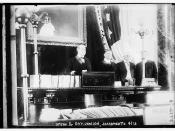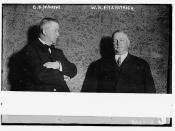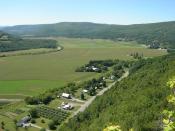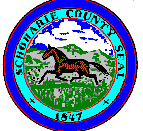Not many people know what effects this major war for independence caused on such a small area or what the valley had to offer to help aid such a cause. The Schoharie Valley is rich in Revolutionary history. Many battles took place and the food that the farms produced provided nourishment to the Continental Army. Schoharie County's role in the Revolutionary War is often overlooked and needs to be given credit for its many achievements and sacrifices that helped win the fight for independence.
German Palatines arrived in New York during the summer of 1710. Before heading to the Schoharie Valley they worked in naval camps to make turpentine and tar. The Palatines soon became dissatisfied with their new life because the trees that they were to make the tar and turpentine from were unsuitable to make them. They wished to go to Schoharie Valley (Schoharie comes from the Indian word To-Was-Scho-Hor, meaning, "Driftwood") , the land in which the king had promised them.
Little towns soon sprung up (Middleburgh in 1712, Sharon Springs in 1772, and Fulton in 1711 just to name a few.) The land was just right for farmers to produce food.
The Schoharie Valley has excellent soil to grow crops in. The Schoharie Creek often overflows and provides the nutrients that help make the soil so rich. Agriculture soon became the number one industry for the county and continues to this day. In fact the first wheat sown in the valley is said to have been sown by Lambert Sternberg in 1713 in the town of Schoharie. The crops grown soon brought prosperity to the residents that resided in the county. Little did the residents in Schoharie know that soon those same fields would provide rations for George Washington's troops. The farms in Schoharie Valley sent 80,000 bushels of wheat to Washington's army when it was stationed in Newburgh. Women also baked hundreds of loaves of bread a day for the army in communal ovens. So many provisions came from the county that it is nicknamed the "Breadbasket of the Revolution." The British knew that the Valley was so important in the production of food for the patriots that they sent Joseph Brant on a raid. He burned farms and ravaged the towns to make sure supplies would no longer be come from the valley. Had the valley not have the rich fertile soil that it did (and still does today) so much food could not have been produced to feed the starving troops. Soldiers do not fare well on empty stomachs and without soldiers a war cannot be won. Schoharie County not only contributed food to the troops but the farmland also soaked up the blood of Redcoats and Patriots alike.
Many battles took place in the Schoharie Valley during the Revolution and with battles heroes emerge. One such hero was Timothy Murphy. During the fall of 1780, Sir John Johnson began to plan the destruction of the forts in the Schoharie Valley. On October 16th, 1780 Loyalists and Indians arrived just outside of the Upper Fort which is located in the town of Fulton on what is today Barber's Farm. Here Murphy, although surrounded by Indians and Tories, told his men that they "must fight or die." He and his men fought but only he survived as Sigsby writes, "His companions doubtless were all sacrificed to the bloody tomahawk, as Murphy never heard anything of them to the day of his death." The next day after a quick alarm from a farmer, the Middle fort (just outside Middleburgh) prepared to fight Sir John Johnson and Joseph Brant. After attempting to knock down the fort's walls with weak artillery, Johnson sent forth some men with a flag of truce, demanding that the fort surrender to "superior forces." This was just a plot of Johnson's to see how many men were really in the fort defending it. General Woolsey was in charge of the fort. When seeing that it was hopeless went inside to sit with the women who were preparing pitchforks, spears and boiling water to help with the attack. Murphy took charge. He decided to shoot a bullet over the flagman's head. They retreated and Woolsey told Murphy not to shoot in which Murphy replied "I'll die before they take me prisoner" and fired again against the General's orders. Murphy also said he'd shoot anyone to run the flag up. Johnson, seeing that the fort's resistance would not cease continued his tour of the valley burning whatever got in his way. Had Timothy Murphy not taken charge and resisted Johnson's attack he along with everyone else in the fort would have been murdered.
Not all the resistances to the war were successful. Tories murdered their patriotic neighbors in hopes to gain their land once the war of independence was over. One such brutal attack was on Ephraim Vroman and his family. In August 1780 the family was attacked by Beacraft and some Tories. Mr. Vroman was struck in the head by a tomahawk and scalped and his wife was too a few minutes later. Their son, Peter, fled and hid in the bushes but was betrayed by one of the slaves. Beacraft slit his throat and then hung him on the fence. Another account of the Vroman Massacre has Ephraim Vroman, grabbing his infant daughter, Christina, and running to the cornfield with his wife and children. They would have escaped if Mrs. Vroman had not said anything to give them away. However, she was frightened that Ephraim had not picked up their daughter before running to the field. They were discovered and their four-year-old daughter was killed when Seths Henry crushed her skull with a rock. Mrs. Vroman was shot and scalped. Ephraim was spared when one of the natives tried to spear him and the baby but the baby thought that it was a game and laughed. Ephraim Vroman was taken prisoner and his infant daughter later died from starvation since her mother had been killed and there was not any food for her.
Schoharie has so much more contribution to the Revolutionary War. The valley is often overlooked when history books are written. The county provided rations to Continental Army and won battles for the patriots. However, it also sacrificed some of its people to help win America's independence from England. Looking at the valley today one would not realize the importance of such a place that is "in the middle of nowhere" and how it helped form America into what it is today.

![[Portrait of Bunk Johnson and Maude Johnson, Stuyvesant Casino, New York, N.Y., ca. June 1946] (LOC)](https://s.writework.com/uploads/17/171599/portrait-bunk-johnson-and-maude-johnson-stuyvesant-casino-n-thumb.jpg)



